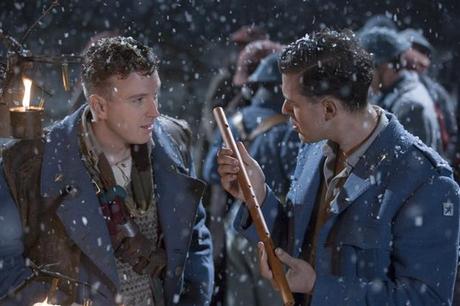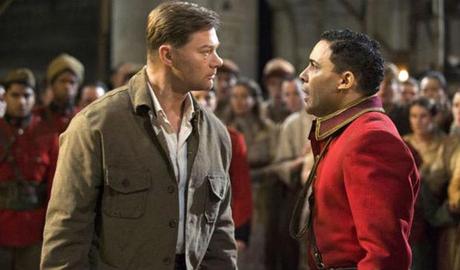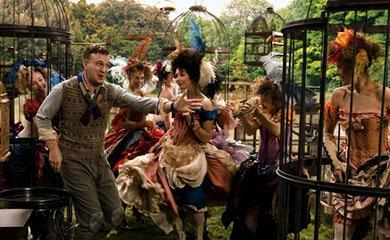
Revising history: now with more Mozart
While I like Kenneth Branagh as a director, love Mozart (obviously,) and have a thing for First World War dramas, I wasn't sure what to expect of the confluence of these three in Branagh's 2006 film of The Magic Flute. Frankly, I was a bit dubious as to how the unwieldy drama and sublime music would be adapted to an alternate history of the Western Front; but in the event, I was won over. The film is unapologetically whimsical, even absurd (to an extent I haven't seen Branagh indulge as a director since Dead Again; here its sheer exuberance recalls Buster Keaton routines.) It's also, however, tender and thoughtful; it doesn't confront very seriously or for very long the historical horrors on which it's loosely based, but this is because of its irresistible sincerity of belief in the fact that love does, in fact, conquer all. In Sarastro's vision, there might just be a way to break the cycle of "war to end all wars," and make peace. That this is Sarastro's vision is not at first clear--one of the things I liked most about the production is that it kept me actually guessing as to the characters' motives, and as to what would actually happen to them. Stephen Fry's transladaptation (to borrow a term from Definitely the Opera) of the libretto is sly and sure-handed, eliminating much of the racism and misogyny while cleaving closely to the German vowel sounds, and the musical values are solid. James Conlon leads the Chamber Orchestra of Europe in a lively and nuanced account of the score, sensitive to the emotional journeys of the characters. (There are some cuts, but the only substantial ones to the spoken dialog.) Joseph Kaiser's Tamino (more likable than most within the first 60 seconds) and René Pape's Sarastro were vocal and dramatic standouts, but the singing was fine all around. I don't mean this as damning with faint praise; on my home speakers, the recording had a tendency to flatten singers' sound, so it was difficult to evaluate the sound they were actually producing. Still, the singing was on the whole musically intelligent, as was (notably and commendably!) the direction. The way the film was shot was itself interesting, with creative camera angles and color palettes, and also related well to the music, I thought (if occasionally succumbing to literalism.) Opera and film being vastly different art forms to begin with, I thought Branagh's gleeful creativity with the latter medium provided a good argument for adapting the former to it. Affection for both Mozart's opera and the possibilities of film animates the endeavor, which I found unexpectedly winsome and touching. The network of theaters screening opera opened the way for its belated U.S. premiere; for showings go here.The whimsical staging of the overture is reminiscent of Blackadder, with armies like tin soldiers deploying over gently rolling plains, a regimental band that includes a string section, and airplanes that swoop and dive to orchestral cadences. Matters become more serious when Tamino faces near-capture in enemy trenches (it's the "angel of death," not a "giftige Schlange," which pursues him; the serpentine vapors over a stagnant pool and the malicious hissing of a thrown grenade are a nod to those who know the opera already.) In this extremity, the Three Ladies appear as in a mirage, nurses who are improbably buxom and clean and crisp. They were all well sung, but I was uneasy about the objectification of women. Still, it makes some sense if their appearance is considered as Tamino's fantasy. He awakes from his swoon in an alternate reality, with the grenade unexploded, so there's the possibility that all that ensues is a hallucination in the moment before death. ...Which is depressing. But in any case, the fairy tale is touching. Papageno, sung by Benjamin Jay Davis, appears as a Yank (which makes the running joke about him being unable to shut up even funnier) and a keeper of homing pigeons, who needs to be convinced that Tamino isn't suffering from shell shock. Pamina's (magic, floating, animated) portrait takes our hero into an Edwardian ball filmed as sumptuously as an escapist costume drama of interwar Hollywood. I loved this, both as eye candy and as a way of showing Tamino's immersion in an imagined future relationship with Pamina. The Queen arrives in predictably transgressive fashion, descending from a tank to make Tamino squirm with her proximity. Lyubov Petrova's voice struck me as unusually soft-grained and lyric for the Queen of the Night, but she dispatched the coloratura creditably. The quintet vision of universal brotherhood is poignantly accompanied by the Christmas truce, but this is short-lived, much to Papageno's disappointment ("I wish this hero hadn't met me!") I thought having the Three Boys looking as though they'd stepped off a sheet music cover might be setting up the dangers of imagining a national future as male and martial... but it wasn't. The boys' tendency to crop up everywhere was made a comic motif, which worked because of children's passion for observing, for sneaking, and for being where they aren't supposed to be.

Monostatos: "But I thought we had male solidarity!"
Sarastro: "You disgust me."* (*not actual dialogue)

"A housewife or a maiden bring Papageno's way
My hope of love is fading with every passing day."

